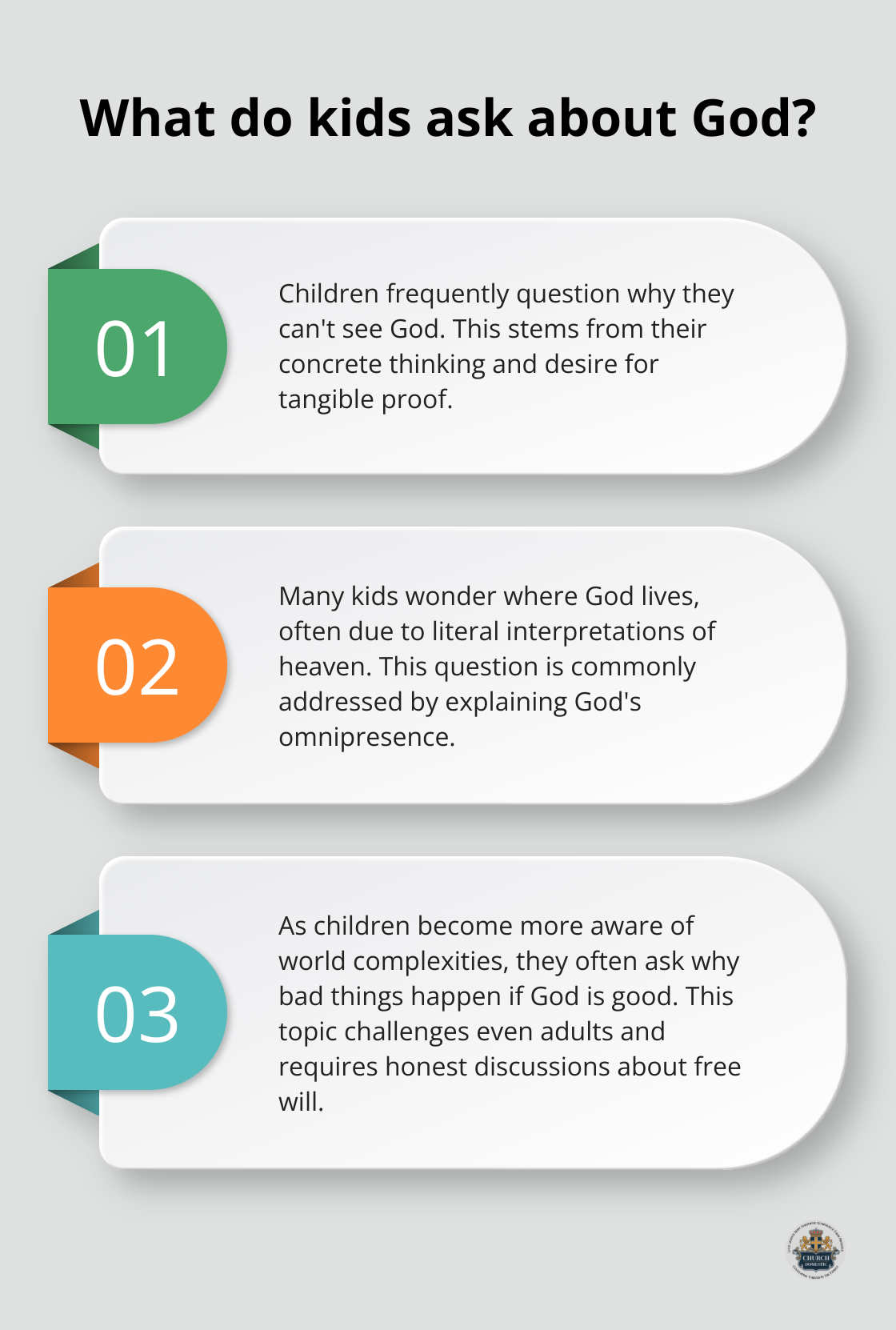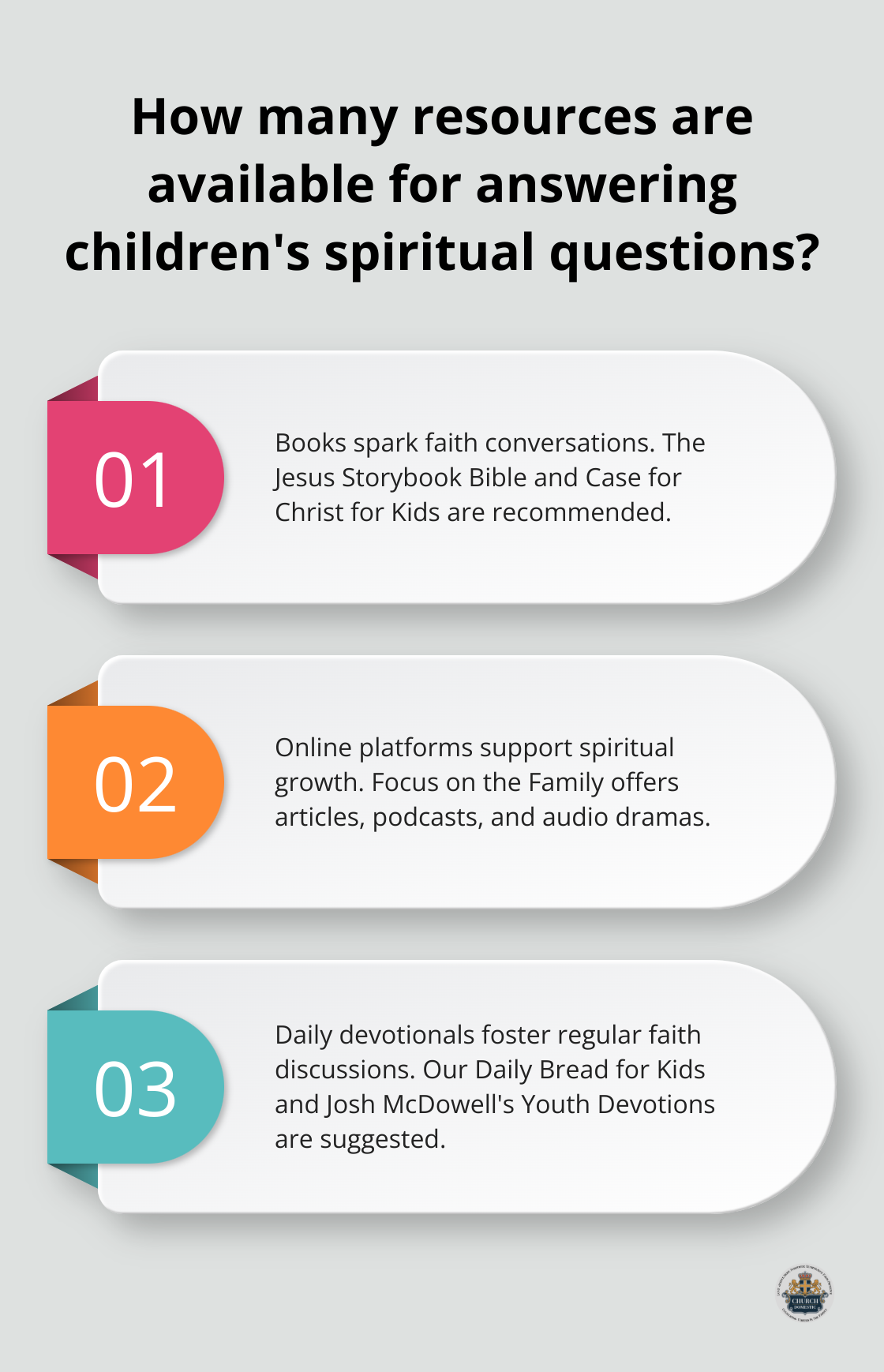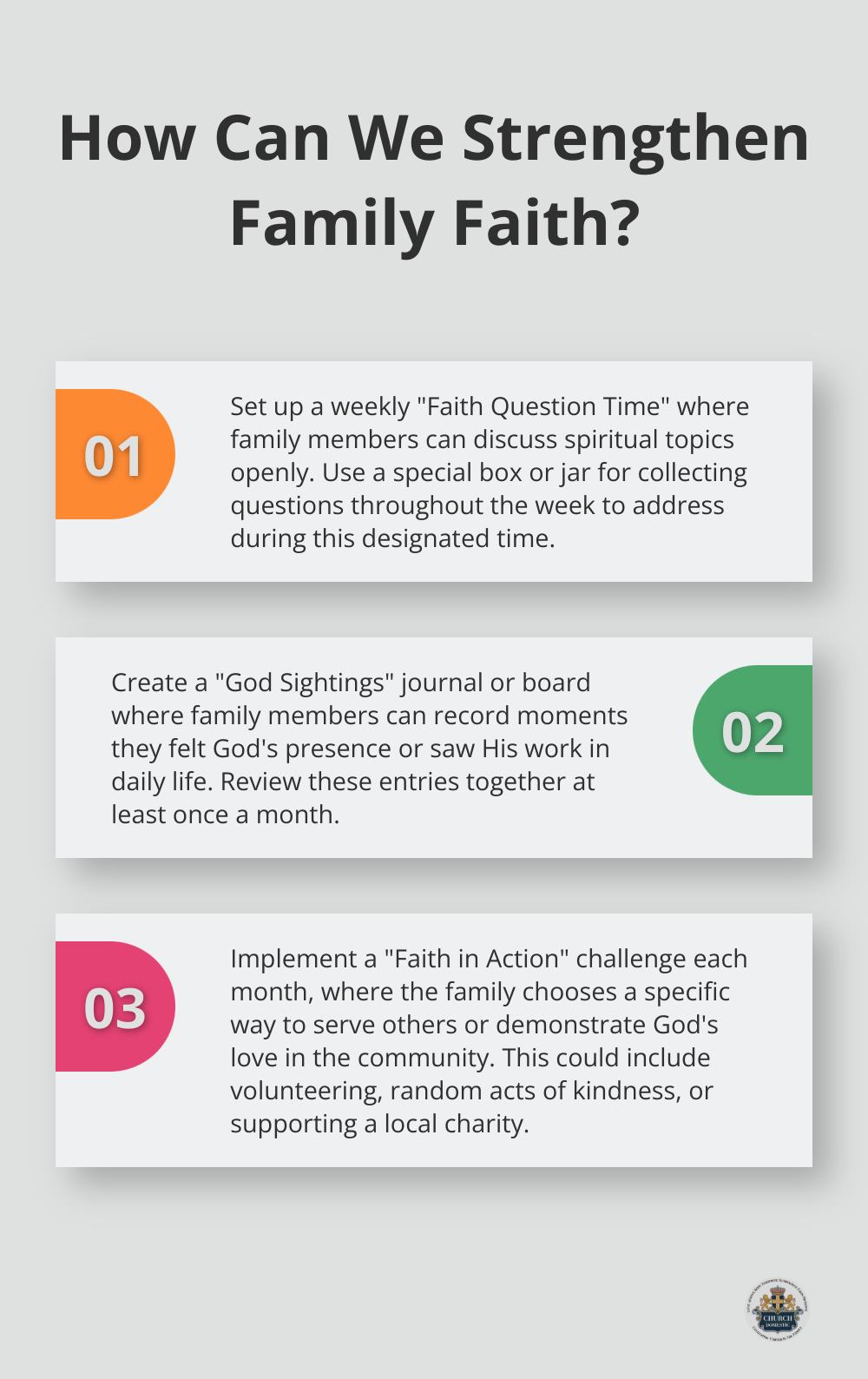At Church Domestic, we understand that children’s curiosity about God can lead to some challenging questions. Faith conversations with kids can be both rewarding and daunting for parents and caregivers.
In this post, we’ll explore common questions children ask about God and provide strategies for addressing them effectively. We’ll also share valuable resources to support you in nurturing your child’s spiritual growth.
What Do Kids Really Ask About God?
Children possess an innate curiosity about the world around them, which extends to their understanding of God. At Church Domestic, we’ve encountered a wide range of questions from young minds trying to grasp the concept of a divine being. Let’s explore some of the most common inquiries and how to approach them.
The Invisible God
One of the most frequent questions children ask is why they can’t see God. This stems from their concrete thinking and desire for tangible proof. When addressing this, it’s helpful to use examples of other invisible yet real things, like love or the wind. Explain that while we can’t see God directly, we can observe the effects of His presence in the world around us.
God’s Dwelling Place
Another common query concerns where God lives. This question often arises from a child’s literal interpretation of heaven. Instead of giving a vague answer about the sky, discuss how God exists everywhere at once. You might use the analogy of air being all around us, yet invisible. Emphasize that God resides in our hearts and in the world around us.
The Problem of Evil
As children become more aware of the world’s complexities, they often struggle with why bad things happen if God is good. This topic challenges even adults. When discussing this, it’s important to be honest about the issue’s complexity. Explain that while God doesn’t cause bad things to happen, He gives people free will, which sometimes leads to poor choices and consequences.

It’s okay to admit that we don’t have all the answers. Encourage children to continue asking questions and exploring their faith as they grow.
God’s Existence
Many children ask how we know God exists. This question often stems from a desire for concrete evidence. Try to explain that while we can’t see or touch God directly, we can see evidence of His work in the world around us (like the beauty of nature or the love between people). You can also share personal experiences of how you’ve felt God’s presence in your life.
As we move forward, let’s explore effective strategies for answering these tough questions and fostering meaningful conversations about faith with our children.
How to Answer Your Child’s Tough Questions About God
Embrace Honesty and Humility
When your child asks a difficult question about God, it’s perfectly acceptable to admit you don’t have all the answers. Children value honesty, and acknowledging uncertainty can actually boost your credibility. Instead of avoiding the question, use it as a chance to learn together. You could say, “That’s an excellent question! I’m not certain about the answer, but we can explore it together.”
Tailor Your Language to Their Level
Using age-appropriate language is essential when discussing complex theological concepts. For younger children, simple analogies often work well. For instance, when explaining God’s omnipresence, you might compare it to how God is always present and always watching, which can be used as a way to deter people from committing sins. As children mature, introduce more sophisticated explanations that align with their developing cognitive abilities.
Foster a Culture of Curiosity
Promote your child’s inquisitive nature by creating an open environment for discussion. Respond to questions with enthusiasm and follow-up inquiries, rather than shutting them down. This approach not only satisfies their curiosity but also helps develop critical thinking skills. You could ask, “What are your thoughts on that?” or “How does that make you feel?” To foster curiosity, commit to deepening your own understanding, ask your kids tough questions they don’t ask, become a detective, and practice critical thinking.
Share Personal Experiences
Your own spiritual journey can provide valuable insights for your child. Share age-appropriate stories about times when you felt God’s presence or guidance in your life. This personal touch can make abstract concepts more relatable and tangible for your child.
Utilize Resources Together
Don’t hesitate to use external resources (such as age-appropriate books or educational videos) to help explain complex topics. Exploring these materials together can spark further discussion and deepen both your understanding. This collaborative approach shows your child that learning about faith is a lifelong journey.

As we move forward, let’s explore some valuable resources that can support you in nurturing your child’s spiritual growth and addressing their questions about God.
Where Can I Find Resources for Answering My Child’s Questions?
At Church Domestic, we know parents and caregivers often need extra support when addressing their children’s spiritual inquiries. We’ve compiled a list of valuable resources to help you navigate these important conversations.
Books That Spark Faith Conversations
Age-appropriate books serve as excellent tools for exploring faith with children. The Jesus Storybook Bible by Sally Lloyd-Jones presents biblical stories in a way that connects them to Jesus. For older children, Case for Christ for Kids by Lee Strobel offers an engaging introduction to God’s existence.
Online Platforms for Spiritual Growth
Numerous online resources can supplement your child’s spiritual education. Focus on the Family provides a wealth of articles and podcasts on parenting and faith. Their Odyssey Adventure Club offers audio dramas that teach biblical principles through storytelling. (Church Domestic also offers a variety of online resources tailored to families seeking to grow in faith together.)
Family Devotionals for Daily Reflection
Daily devotionals in your family routine can foster regular discussions about faith. Our Daily Bread for Kids presents bite-sized devotions perfect for young attention spans. For families with teens, The One Year Josh McDowell’s Youth Devotions encourages critical thinking about faith and life.
Community Support for Faith Journey
Local churches often offer Sunday School classes and youth groups that reinforce the spiritual lessons you teach at home. Many churches also provide parenting classes focused on raising children in faith. Don’t hesitate to reach out to your church leaders for recommendations tailored to your family’s needs.
Interactive Faith-Based Activities
Try engaging your children in hands-on activities that reinforce spiritual concepts. Create a prayer jar where family members can add prayer requests throughout the week. Design a family faith timeline to visualize your spiritual journey together. These interactive approaches can make abstract concepts more tangible for children and serve as practical apologetics for children.

Final Thoughts
Faith conversations with children present both challenges and opportunities for spiritual growth. Parents can address tough questions about God by using age-appropriate language, sharing personal experiences, and utilizing helpful resources. This ongoing dialogue forms a strong foundation for a child’s faith and allows families to explore their beliefs together.

At Church Domestic, we support families in their spiritual journeys with resources designed to facilitate important conversations about faith. We encourage parents to view these discussions as opportunities for their own spiritual development as well. As you seek answers to your child’s questions, you may discover new aspects of your own beliefs.
Your family’s connection to faith strengthens through these valuable interactions. Embrace these moments and watch your family’s spiritual life flourish. For more guidance on nurturing your child’s faith, visit our resources for families at Church Domestic.